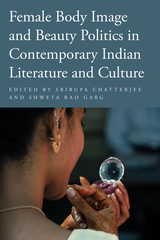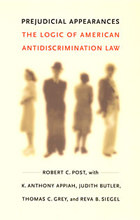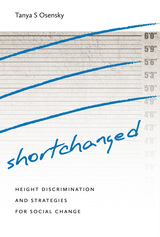3 books about Physical-appearance-based bias

Female Body Image and Beauty Politics in Contemporary Indian Literature and Culture
Edited by Srirupa Chatterjee and Shweta Rao Garg
Temple University Press, 2024
Female Body Image and Beauty Politics in Contemporary Indian Literature and Culture is the first volume to analyze the myriad conceptualizations of South Asian women’s body issues in film, literature, advertising, and other media. Showing how body image and self-identity are constructed in contemporary neoliberal India, the editors and contributors theorize issues of body image vis-à-vis Indian womanhood while touching upon political, socio-economic, and cultural parameters.
Influences from the colonial period through the age of the internet and globalization have reinforced Eurocentric ideals about femininity and womanhood. This long overdue volume addresses the pressures of beautification that Indian women face as they struggle with body acceptance and are often denied pride in their natural bodies.
Contributors: Annika Taneja, Anurima Chanda, Aratrika Bose, Kavita Daiya, Ketaki Chowkhani, Nishat Haider, Samrita Sinha, Shailendra Kumar Singh, Shubhra Ray, Sucharita Sarkar, Sukshma Vedere, Swatie, Tanupriya, Turni Chakrabarti, and the editors.
Influences from the colonial period through the age of the internet and globalization have reinforced Eurocentric ideals about femininity and womanhood. This long overdue volume addresses the pressures of beautification that Indian women face as they struggle with body acceptance and are often denied pride in their natural bodies.
Contributors: Annika Taneja, Anurima Chanda, Aratrika Bose, Kavita Daiya, Ketaki Chowkhani, Nishat Haider, Samrita Sinha, Shailendra Kumar Singh, Shubhra Ray, Sucharita Sarkar, Sukshma Vedere, Swatie, Tanupriya, Turni Chakrabarti, and the editors.
[more]

Prejudicial Appearances
The Logic of American Antidiscrimination Law
Robert C. Post, with K. Anthony Appiah, Judith Butler, Thomas C. Grey, and Reva B. Siegel
Duke University Press, 2001
In Prejudicial Appearances noted legal scholar Robert C. Post argues modern American antidiscrimination law should not be conceived as protecting the transcendental dignity of individual persons but instead as transforming social practices that define and sustain potentially oppressive categories like race or gender. Arguing that the prevailing logic of American antidiscrimination law is misleading, Post lobbies for deploying sociological understandings to reevaluate the antidiscrimination project in ways that would render the law more effective and just.
Four distinguished commentators respond to Post’s provocative essay. Each adopts a distinctive perspective. K. Anthony Appiah investigates the philosophical logic of stereotyping and of equality. Questioning whether the law ought to endorse any social practices that define persons, Judith Butler explores the tension between sociological and postmodern approaches to antidiscrimination law. Thomas C. Grey examines whether Post’s proposal can be reconciled with the values of the rule of law. And Reva B. Siegel applies critical race theory to query whether antidiscrimination law’s reshaping of race and gender should best be understood in terms of practices of subordination and stratification.
By illuminating the consequential rhetorical maneuvers at the heart of contemporary U.S. antidiscrimination law, Prejudical Appearances forces readers to reappraise the relationship between courts of law and social behavior. As such, it will enrich scholars interested in the relationships between law, rhetoric, postmodernism, race, and gender.
Four distinguished commentators respond to Post’s provocative essay. Each adopts a distinctive perspective. K. Anthony Appiah investigates the philosophical logic of stereotyping and of equality. Questioning whether the law ought to endorse any social practices that define persons, Judith Butler explores the tension between sociological and postmodern approaches to antidiscrimination law. Thomas C. Grey examines whether Post’s proposal can be reconciled with the values of the rule of law. And Reva B. Siegel applies critical race theory to query whether antidiscrimination law’s reshaping of race and gender should best be understood in terms of practices of subordination and stratification.
By illuminating the consequential rhetorical maneuvers at the heart of contemporary U.S. antidiscrimination law, Prejudical Appearances forces readers to reappraise the relationship between courts of law and social behavior. As such, it will enrich scholars interested in the relationships between law, rhetoric, postmodernism, race, and gender.
[more]

Shortchanged
Height Discrimination and Strategies for Social Change
Tanya S Osensky
University Press of New England, 2017
Would you like to be taller? Many people—except very tall people—would likely answer yes. Why should this be the case, when height has nothing to do with intelligence, talent, fortitude, compassion, or indeed any of the factors that make us human? In her thoughtful and provocative book, Tanya S Osensky examines “heightism”: the widely held and mostly unconscious notion that taller is better. She explores how and why short people are considered by many to be inferior, and describes the ways in which height bias affects them. Prejudice against short people is so common and casual that we do not even notice it, yet it factors significantly into discrimination in the workplace, in social situations, and beyond. The most helpless victims are short children, who are frequently subjected to years of hormone therapy, even when they have no physical need for such treatment, simply in an effort to make them taller as a way of countering this social bias. There is little legal recourse for short people who suffer workplace discrimination based on height. This succinct book exposes the cultural, medical, and occupational issues that short people face, which are often deemed unimportant and disregarded. Osensky challenges heightism by disclosing some beneficial aspects of shortness and suggesting avenues of activism and change.
[more]
READERS
Browse our collection.
PUBLISHERS
See BiblioVault's publisher services.
STUDENT SERVICES
Files for college accessibility offices.
UChicago Accessibility Resources
home | accessibility | search | about | contact us
BiblioVault ® 2001 - 2024
The University of Chicago Press









